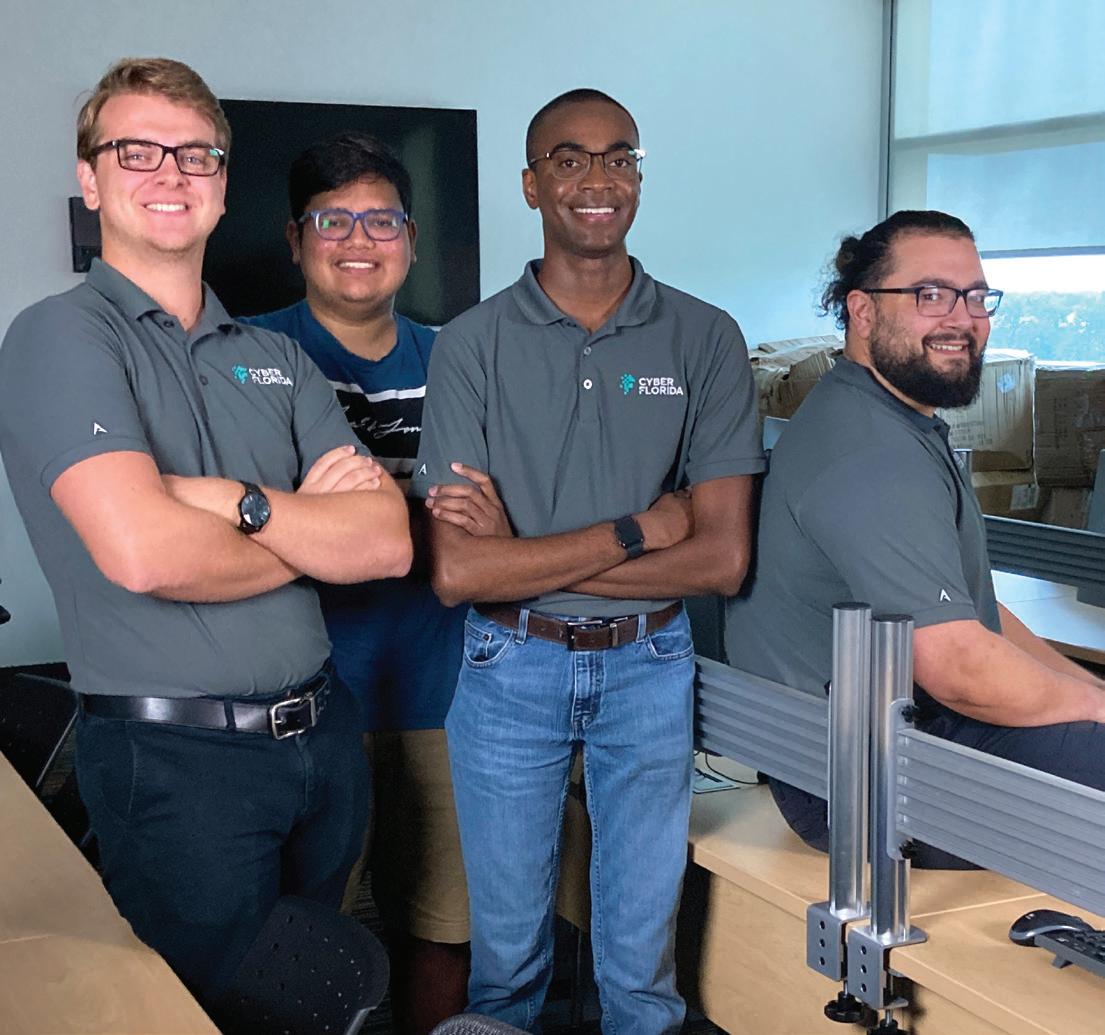
3 minute read
OUR
Contribute to the state of the art in cybersecurity research.
Initiatives
2.1 Expand, accelerate, and target Cyber Florida grant programs.
2.2 Expand statewide cyber research collaboration and funding.
2.3 Shape federal grant funding to create more SUS cybersecurity research opportunities.
Creating Resources for Cyber Citizenship (2.1, 2.2)
Aligns to Florida Board of Governors strategic goal Scholarship, Research & Innovation>Increase research activity & attract more external funding.
Numerous investigations have revealed that U.S. adversaries such as Russia, China, and North Korea are using cyberspace to influence U.S. citizens’ thinking and behavior through misinformation and disinformation, posing an urgent threat to democracy and public safety. To help address this growing threat, Cyber Florida partnered with New America and the National Association for Media Literacy Education (NAMLE) to create a curated online catalog of resources for K-12 teachers to help teach “cyber citizenship”—a combination of civics and media literacy to help young people learn to navigate cyberspace without falling victim to misinformation or disinformation.
• In partnership with USF Assistant Professor Nate Fisk and the Florida Center for Instructional Technology, NAMLE created an online portal equipped with 100 curated resources for teachers, which launched nationwide in June 2022. Visit cybercitizenshipeducation.org to learn more.
Shaping State Cybersecurity Policy (2.3, 3.3)
Aligns to Florida Board of Governors strategic goal Scholarship, Research & Innovation>Increase research activity & attract more external funding.
The 2021-2022 academic year marked a strong foray into the public policy realm for Cyber Florida. Former executive director, Vice Admiral (Ret.) Mike McConnell, was appointed by Governor DeSantis to the Florida Cybersecurity Advisory Council, which is tasked with assisting state agencies in protecting their information technology resources from cyber threats and incidents. Following Executive Director McConnell’s retirement, his successor, General (Ret.) Frank McKenzie, has continued to support and consult with the council.
Additionally, Cyber Florida has served in an advisory capacity to various Florida state legislators, specifically related to the drafting of HB 7055: Cybersecurity, which was signed into law in June 2022. Cyber Florida received $57.5M in legislative appropriations for the 2022-2023 fiscal year for cybersecurity training and education, workforce development, research and simulation activities at USF. The specific appropriations are as follows:
$10M in recurring funds to Cyber Florida’s operational budget.
$10M in recurring funds and $500K in nonrecurring funds to develop and equip a Cyber Attack and Simulation Range to provide training and testing in a highly technical, simulated environment.
$7M in nonrecurring funds to conduct a comprehensive risk assessment of the state’s critical infrastructure and provide recommendations to support actionable solutions for improvement of the state’s preparedness and resilience to significant cybersecurity incidents.
• $30M in nonrecurring funds to conduct cybersecurity training for state and local government executive, managerial, technical, and general staff.
The Illinois Institute of Technology awaits the final results at the NCAE Cyber Games live stream.
NCAE Partnerships (2.3)
Aligns to Florida Board of Governors strategic goals Community & Business Engagement>Increase Community & Business Engagement and Community & Business Engagement>Increase Community & Business Workforce
In 2020-2021, Cyber Florida partnered on three projects funded by the National Centers of Academic Excellence in Cybersecurity (NCAE-C) program to lead national cybersecurity educational initiatives. The initial grant duration concluded in 2021-2022, with the following outcomes:
In partnership with Mohawk Valley Community College, Cyber Florida helped implement the nation’s first cyber competition for new cyber competitors. The program is designed to help more students engage in cyber competitions, which employers look for on resumes. More than 50 colleges and universities and over 500 students participated nationally. This project has been approved to continue for 2022-2023.
• Cyber Florida supported the University of West Florida in their role as the Southeast Regional Hub for the NCAE-C program. Cyber Florida earned recognition for the outreach activities conducted on behalf of the Southeast Regional Hub.
• Cyber Florida was part of a 10-institution consortium led by the University of West Florida to implement a national workforce development initiative called CyberSkills2Work. Our CyberWorks career training program served as one of the pilot initiatives, and this grant was approved to continue for 2022-2023.
Searching for the Cyber Unicorn (2.1, 2.2)
Aligns to Florida Board of Governors strategic goal Scholarship, Research & Innovation>Increase research activity & attract more external funding.
More and more, recent graduates have reported encountering a barrier to getting their cybersecurity careers started: so-called “entry-level” positions requiring significant experience. Rather than relying on anecdotal reports, Cyber Florida contracted with the Burley Group to investigate the phenomenon. The Burley Group is investigating the frequency of entry-level cyber positions asking for multiple years of experience and surveying applicants to see if this is merely a perception or a significant obstacle preventing recent graduates from entering the field.
The results of the study will inform future education and workforce development programs, and outreach efforts to employers.
The first year’s data is being analyzed, and based on initial reporting, the project scope will shift, focusing on Florida specific trends. The primary objective remains to understand the root causes of the entry-level cyber workforce challenges.
• Reinstate Cyber Florida’s research funding program to support new research initiatives across the State University System of Florida and add opportunities for the Florida College System.
• Expand the Faculty Fellows program to improve collaboration and coordination among SUS institutions.
• Establish an Associate Director of Research to assist in securing external funding for cybersecurity research and build a cybersecurity research network across institutions.
• Continue to engage with state and national leaders to ensure ongoing funding in support of state and national cybersecurity programs.
Our
Make Florida the most cyber-secure state.
Initiatives
3.1 Improve the cybersecurity of Florida’s public and private sectors.
3.2 Improve the cyber hygiene of Florida’s citizens.
3.3 Develop and implement a public policy agenda.







